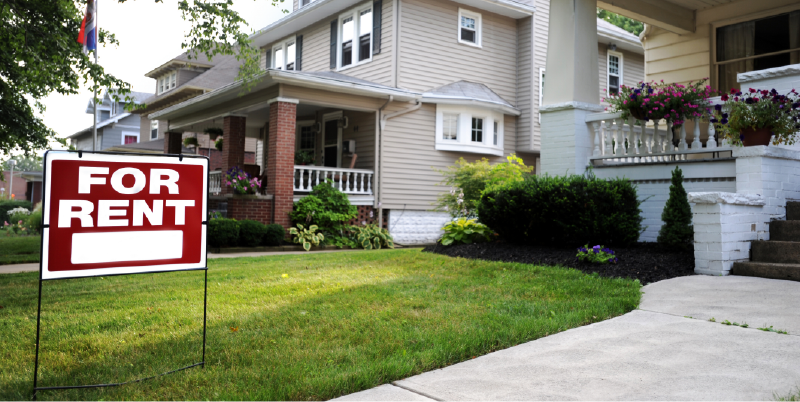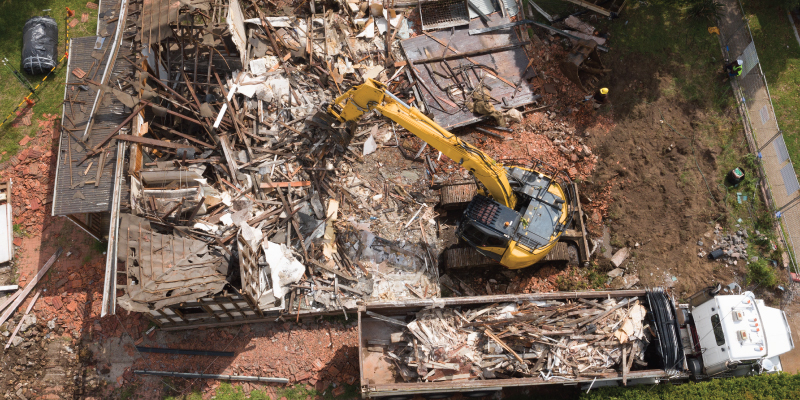
Updated November 4, 2022
There are a number of reasons why homeowners consider turning their home into a rental property.
Whether you want to make supplemental income, you want to sell your home but are currently unable to break even on the sale, or you inherited a property you don't wish to sell, turning a home into a rental property is becoming more and more common.
Regardless of your reason for wanting to turn your home into a rental property—either completely or partially—you’ll first need to prepare your house and yourself.
You don't have to look very far to find all kinds of horror stories of landlords dealing with stress and headaches more than profits, which is why it's so important to take your time deciding if renting your home is the best option for you, or if selling is ultimately the better choice.
In this guide, we list our biggest tips for transitioning your home into a rental property, whether it's one room or the entire home, and what to consider first.
Our biggest tips include:
- Weigh the Pros and Cons
- Know Mortgage Laws
- Check with Your HOA
- Update Homeowner's Insurance Policy
- Get Familiar with Tax Changes
- Prepare Your Property
- Secure Necessary Permits
- Research How to Be a Landlord
- Run the Numbers

Tip #1: Weigh the Pros and Cons
Converting your home into a rental property is a major commitment that shouldn't be taken lightly.
Before moving forward with the next steps, be sure you take the time you need to realistically and honestly determine if owning and managing a rental property is something you are able to handle.
Here are a few of the various pros and cons that come with renting your home that we think you should consider (but these are by no means the only considerations to make).
Advantages
- Pay down your mortgage while also earning extra cash
- Build your wealth and diversify/supplement your income
- Allows you to postpone selling your home until you get an offer that allows you to break even
- Potentially qualify for certain tax deductions
Disadvantages
- Managing a rental property can be very time consuming
- Sole responsibility for handling rental property expenses, like routine maintenance, landlord insurance, real estate attorney fees, etc.
- Rental income can vary, especially when rental markets are in flux
- Risk of dealing with theft, vandalism, bad tenants, etc.
Tip #2: Know Mortgage Laws
If you have a mortgage on your home, in most states, you need to live in said home for a minimum of 12 months before you can turn it into a rental.
Buying a home for the purpose of making it your primary residence, and then converting it to a rental property down the road has multiple advantages, too.
In most cases, mortgage loans for primary residences have a smaller down payment and a lower interest rate than those for investment properties or vacation homes.
With that being said, re-read your loan contract and reach out to your lender to determine your loan's exact rules regarding turning the home into a rental.
It's important you know what rules are in place for your loan in order to avoid mortgage fraud or any other legal headaches.
If a lender finds a property owner has committed fraud, they could call the loan, which typically leads to foreclosure.
If you’re considering moving out of your current primary home and want to buy another house to live in, converting your current home into a rental property, then you will also need to determine if you qualify for another mortgage before moving forward with the rental property process.
Reach out to your mortgage lender to discuss what's involved with this process, as they may consider the income you anticipate receiving from your rental property.
Once you’ve confirmed that you've lived in your home for your mortgage's required timeframe, you can move on to the next steps of turning your home into a rental property.
Tip #3: Check with Your Homeowners Association
If your neighborhood is overseen by a homeowners association (HOA), there may be rules regarding renting your house out, or it may be restricted completely.
Some HOAs don’t have any restrictions whatsoever, while others completely prohibit residents from renting out their homes in that neighborhood.
In the case of HOAs that allow a certain number of homes to be rentals at one time, your home could be placed on a waiting list until one of those slots becomes available.
Some HOAs are very understanding and allow you to rent out your home during times of hardship, even if the community has reached its designated limit.
If you purchased a home in a neighborhood with an HOA, reread the fine print and familiarize yourself with rules regarding renting out your property, who is responsible for paying HOA fees, etc.
Tip #4: Update Your Homeowners Insurance Policy
The insurance you purchased for your home when it was your primary residence will be different from the policies available for rental properties, which is why it's necessary for you to switch your insurance to a landlord's policy.
If you fail to do so, and you end up having to file a claim with your primary insurance after the home has been rented out, your insurance company could deny your claim, leaving you responsible for paying out of pocket.
Landlord insurance is protection against unforeseen issues that inevitably pop up, and it protects you in ways a regular homeowners insurance policy doesn't.
Landlord insurance combines property insurance and liability insurance.
With property insurance, the home, other parts of the property, like a deck or fence, and any personal property are covered against loss or damage.
With liability insurance, you are protected against losses incurred because of legal costs or medical bills if you’re found liable for injuries sustained by other people on your property.
Anytime someone is on a property you own, you take on a certain degree of responsibility for their safety, so don't underestimate the importance of the right insurance policy.
As soon as you decide that you want to rent out your home, it's time to reach out to your insurance company.
Tip #5: Familiarize Yourself with Tax Changes
We recommend consulting with an accountant early on in this process as well, as they can help ensure you are aware of all the financial ins and outs.
Your rental property income will be taxable, so finding out how your tax rate might change is important.
After converting your primary residence to a rental property, expenses involved with doing so may qualify for tax deductions.
Here are some examples of rental property tax deductions:
- Property taxes
- Repairs and renovations
- Mortgage interest
- HOA fees
- Landlord insurance policy
- Utilities (if you pay for them as landlord)
Be sure you learn about the homestead exemption as well. (You can do so by getting in touch with your local municipality or tax adviser.)
If you have a homestead exemption on your primary residence, they'll be able to help you with the next steps if you want to convert your home into a rental property.
Tip #6: Prepare Your Property
It should go without saying that, before listing your property for rent, you should ensure your property is safe and in proper working order.
Make any necessary repairs to appliances, heating and cooling systems, plumbing, windows/doors, etc.
In addition to repairing any broken or faulty aspects of the home, consider any other low-cost renovations that could pay off, too.
Investing in upgrading the home can increase curb appeal, attract more buyers, and boost your overall rental price.
A good way to determine what needs to be done and what could be done is by creating a running list of all the repairs and improvements you envision, budgeting them out, and completing them over time as needed/desired.
A thorough deep cleaning, fresh coat of interior and/or exterior paint, and improving the landscaping are three low-cost ways to upgrade your property.
Need remodeling help or interior demolition? Find local contractors who can get it done for less.
Learn more:
- 5 Ideas for Small Bathroom Remodels
- 3 Remodeling Projects That Improve Your Home’s Accessibility and Boost Its Value
- Find a Qualified Contractor for Your Home Remodeling Project
Tip #7: Secure the Required Permits
Many municipalities require a permit for residential rental properties for safety purposes.
Typically, these permits are relatively inexpensive.
They require a local government-appointed inspector to inspect the property for potential safety or health hazards, like safe electrical, heating, and exits.
After completing the inspection, the inspector will provide you, the landlord, with a report outlining any necessary repairs or modifications that must be made prior to considering the property compliant.
Where you live and your local laws will determine permit requirements, so contact your local office to find out if you need one.
Tip #8: Research How to Be a Landlord
Once you know you are able to turn your primary residence into a rental property, we recommend researching the process of becoming and being a landlord in more detail so you can anticipate what to expect and be prepared.
Read up on how to handle basic landlord responsibilities, such as screening tenants, producing lease agreements, handling maintenance requests, collecting rent, planning for rental property expenses, etc.
If you don't have time to manage the property or maintenance requests yourself, or if you simply would like help as a first-time landlord, hiring a professional property manager is a great option, but something you'll have to budget for.
We also recommend consulting with an attorney to be sure you have a thorough understanding of various laws, like landlord-tenant laws, fair housing laws, etc.
The more educated you can be going into the rental process, the less mistakes will happen along the way and the more set up for financial success you'll be.
A good rule of thumb is to follow the law, keep track of any and all records, adequately protect yourself, and be as proactive about problems as possible.
Tip #9: Run the Numbers

Before putting your new rental property on the market, it's important to really crunch the numbers and determine what is a fair rental rate to ask and what your profits would look like on average.
List out all the costs associated with the property, like:
- Mortgage payment
- Property taxes
- Utilities
- Money you've spent on repairs
- Estimated cost of maintenance, repairs, and additional expenses
While also taking into consideration what your ideal monthly profit is, decide on an appropriate rental rate, then check other rental properties in the area to see how the cost compares.
Keep reading:


